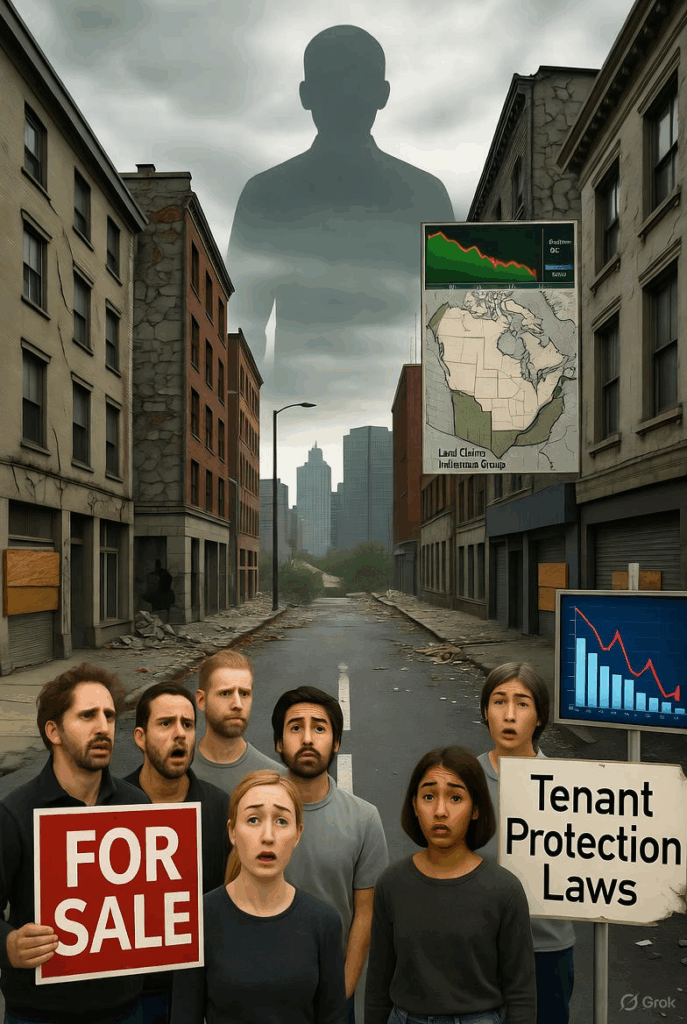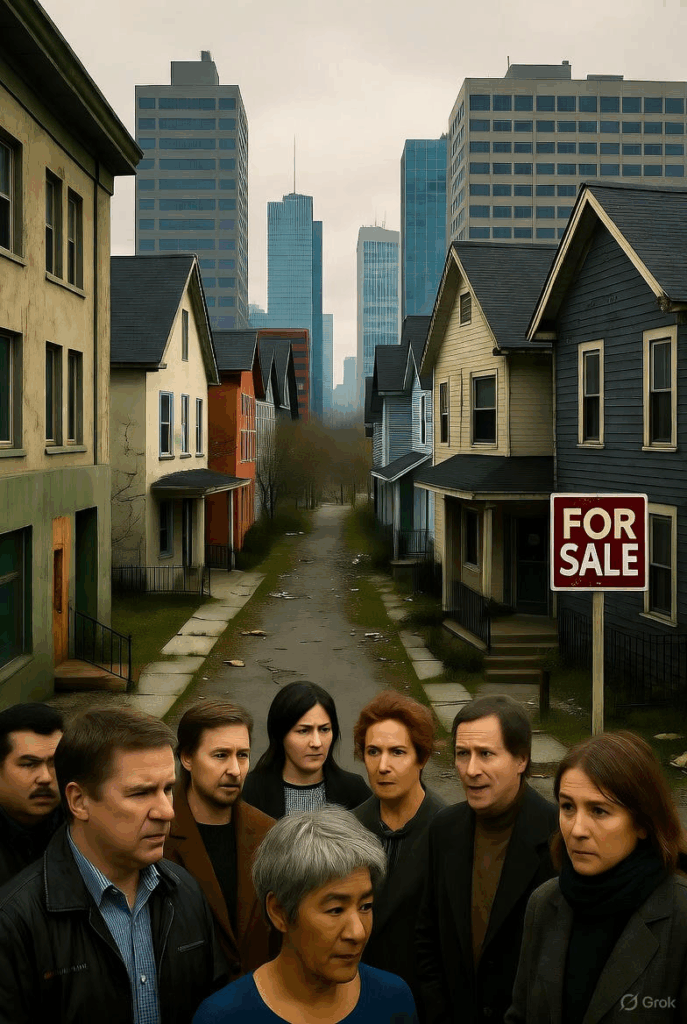By Maria Rekrut, Real Estate Rebel
November 2, 2025
How Economic Chaos, Skyrocketing Costs, and Looming Deadlines Are Crushing Investor Portfolios in 2025
I’ve been in real estate for over 25 years, starting in 2000—buying single family homes in Ontario, scaling my Short Term Rental Units in Niagara, and even dipping my toes into fix and flip. It was supposed to be the golden ticket: leverage, appreciation, passive income. But lately? It’s felt like watching a house of cards collapse in slow motion. Prices are tanking, governments are stacking the deck against landlords, Indigenous land claims are redrawing maps overnight, and now censorship bills are gagging anyone who dares call it out. If you’re an investor like me, staring at your portfolio and wondering if it’s time to bail, you’re not alone. This isn’t just a dip; it’s a systemic gut-punch. Let’s unpack how these forces are colliding and where they’re dragging us all.

Tenant Laws: The Landlord’s New Nightmare
Remember when being a landlord meant being the boss? Those days are deader than a flipper’s margins in a buyer’s market. Across Canada, provinces are rolling out tenant protections that make eviction feel like a felony. In Ontario, Bill 97 (the “Working for Workers Act” sequel) just expanded rent controls to all units built after 2018—goodbye, vacancy decontrol. British Columbia’s latest salvo? Caps on security deposits and mandatory “good faith” negotiations for renewals, turning every late payment into a tribunal circus.
Quebec’s no better: the Tribunal administratif du logement (TAL) is now fast-tracking tenant complaints, with fines for landlords up to $5,000 per violation. And don’t get me started on the federal push via the Canada Mortgage and Housing Corporation (CMHC)—their “Renters’ Bill of Rights” is floating around Parliament, promising nationwide caps on increases tied to inflation plus 2%. Inflation’s at 3.2% right now; that’s a 5.2% max hike when your costs (insurance, taxes, maintenance) are spiking 8-10%.
The result? Yields are evaporating. A Toronto triplex that netted 6% last year? Now it’s scraping 3.5% after legal fees and lost rent from endless appeals. We’re not investors anymore; we’re reluctant social workers, subsidizing lifestyles we can’t afford ourselves. Disappointing? Try soul-crushing.
Land Back: Redrawing the Map Under Our Feet
If tenant laws are a thorn, Indigenous reconciliation is the earthquake. It’s noble in theory—who wouldn’t support righting historical wrongs?—but the execution is chaos for property owners. In Richmond, BC, the Tsleil-Waututh and Musqueam nations just secured a landmark deal last month: 200 acres of waterfront land reverted to Indigenous title, including prime development sites along the Fraser River. That’s not abstract; it’s $500 million in assessed value yanked from the market overnight. Developers are scrambling, permits frozen, and resale values in the area have dipped 12% since the announcement. As one local broker told me off-record, “It’s like the government’s saying, ‘Sorry, not yours anymore—oh, and good luck selling.'”
Zoom out to Quebec, and it’s apocalypse-now territory. The Cree Nation and Innu filed a massive claim in 2024 under the James Bay and Northern Quebec Agreement’s successors, demanding co-management (read: veto power) over half the province’s territory—think 400,000 square kilometers of boreal forest, mining rights, and hydro infrastructure. The Quebec government blinked first, offering a $2.5 billion settlement package that includes land transfers and revenue shares from resource extraction. But here’s the kicker: it explicitly targets “underutilized” private holdings for buybacks at “fair market value.” Fair? Try 20-30% below comps, per early appraisals. Hydro-Quebec’s already halting expansions; real estate adjacent to claimed lands is hemorrhaging value, with Montreal-adjacent cottages down 15% YTD.
For investors, this isn’t “progress”—it’s expropriation by another name. Our portfolios, built on the assumption of stable title, are now lottery tickets in a game where the house always wins. And the worst part? Questioning the pace or process gets you labeled a colonizer. More on that in a sec.
The Price Plunge: From Boom to Bust in Record Time
All this regulatory Armageddon is doing what gravity does best: pulling prices down. Canada’s national average home price hit $685,000 in Q3 2025— a 7.8% drop from last year’s peak, per CREA data. Vancouver? Down 11%. Toronto: 9.2%. Even “affordable” markets like Halifax are off 6%. Why? Supply’s flooding in—ghost inventory from spooked sellers, plus government incentives for first-time buyers (hello, 30-year amortizations) that ironically juice demand short-term but scare off investors long-term.
Vacancy rates are climbing to 4.5% nationally, the highest since 2002. Rents? Stagnant or falling in 60% of major markets, thanks to those tenant shields. My own holdings? A duplex in Burnaby that’s lost $80K in equity since spring. We’re not talking a correction; this is a reckoning. And with interest rates hovering at 4.75% (Bank of Canada whispers of cuts notwithstanding), cap rates are compressing to oblivion. Buy now? You’d need a crystal ball and a prayer.
Censorship’s Chilling Grip: Bill C-2 and the Death of Dissent
Just when you think it can’t get worse, enter the censorship creep. Bill C-2, the innocuous-sounding “Strong Borders Act” from earlier this year, started as immigration reform but ballooned into a surveillance state Trojan horse. Buried in its 400 pages? Provisions for “hate speech” monitoring on platforms, with fines up to $1 million for “disinformation” that “undermines social cohesion.” Real estate tie-in? Try discussing Indigenous claims or tenant laws critically—sudden fact-checks, shadow-bans, or worse, CRA audits if you’re deemed a “disruptor.”
It’s the sequel to C-11 and C-63: governments deciding what’s “harmful” speech, with real estate investors caught in the crossfire. Want to blog about how land-back deals tank your ROI? Risk a CRTC complaint. Podcast on Quebec’s claims? Platform liability under C-2 could nuke your reach. We’re self-censoring out of fear, stifling the very debates that could lead to balanced policy. It’s not just disappointing—it’s dystopian. Free markets need free speech; without it, we’re flying blind into the storm.

Where Are We Headed? A Roadmap for the Ruins
So, what’s the endgame for us real estate die-hards? Buckle up—it’s not pretty, but it’s not hopeless.
- Diversification or Die: Ditch the all-in Canada bet. Look south to U.S. sunbelt markets (Texas, Florida) where yields still hit 7% without the reconciliation roulette. Or go REITs—liquid, diversified, and immune to on-site evictions.
- Short-Term Plays Only: Long holds are toxic. Focus on Airbnbs in tourist havens or student housing where regs are looser. But even there, watch for provincial pivots.
- Advocacy Over Silence: Despite C-2’s shadow, join coalitions like the Canadian Home Builders’ Association. Push for “investor protections” in reconciliation deals—tax credits for compliant holdings, say.
- The Big Pivot: If prices keep sliding (and models say another 5-10% by 2026), cash out high-basis assets now. Reinvest in hard assets like farmland (ironically, less exposed to urban claims) or even crypto-stabilized income streams. Real estate’s not dead, but the Canadian dream version? On life support.
We’re heading toward a bifurcated market: the ultra-luxury enclave for the 1%, and the rest—a regulated rental dystopia where investors are tolerated at best, vilified at worst. My disappointment runs deep; I poured my life into this, only to watch ideologues and activists rewrite the rules mid-game. But here’s the silver lining: the smart ones adapt. The rest? They’ll be the cautionary tales.
Like Klaus Schwab of the World Economic Forum warned us. ” You Will Own Nothing and Be Happy” #quote
What about you? Holding firm or bailing? Drop your thoughts in the comments—before C-2 decides they’re “harmful.” Let’s talk before the muzzles tighten.
If this hit home, subscribe for more unfiltered takes on surviving the squeeze. Share if you’re as pissed as I am.
RealEstateUnraveling2025, #InvestmentNightmares, #RealEstateCrash, #PropertyInvestorStruggles, #HighInterestRateHell, #LoanMaturityCrisis, #InflationRealEstateFail, #GeopoliticalPropertyRisks, #VacancyRateNightmare, #RefinancingRealEstate, #AIBubbleBurst, #HousingMarketMeltdown, #OverleveragedInvestors, #SupplyShortageScare, #PoliticalRealEstateChaos
why real estate investments are failing in 2025, real estate market crash effects on small investors, high interest rates killing real estate dreams, navigating loan maturities in commercial real estate 2025, insurance cost surges impacting property investors, geopolitical risks unraveling real estate portfolios, how inflation is turning real estate into nightmares, recovering from overleveraged real estate investments, signs of real estate bubble bursting for investors 2025, ai disruption challenges in commercial real estate investing, high vacancy rates hurting rental income 2025, political uncertainty effects on housing market investors, supply shortages causing real estate investor nightmares, refinancing risks for real estate owners in uncertain economy, regulatory changes challenging real estate portfolios 2025

 Follow
Follow









